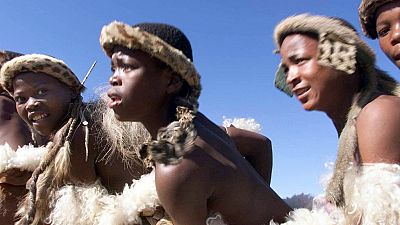South Africa
A group of thousands of topless girls with reed sticks are to dance Saturday before the Zulu king, the traditional leader of South Africa's largest ethnic group, in a ritual that once allowed the ruler to choose his wives.
The "reed dance", which was interrupted for a time because of the Covid pandemic, is normally held every year in September, which marks the beginning of spring in the southern African country.
Legend has it that if the girl is no longer a virgin, the reed will not stay raised to the sky.
"I can't wait for the weekend, I'm so excited, it's been a long time since we've all been together," Thembalami Dumakade, 23, told AFP.
The ceremony is due to take place in the hills of KwaZulu-Natal, a province in the south-east of the country open to the Indian Ocean, in one of the palaces of the small town of Nongoma, the stronghold of the Zulu royal family.
King MisuZulu Zulu, 47, was crowned according to tradition last month after the death of his father, Goodwill Zwelithini, who ruled for 50 years. Huge crowds gathered in the cradle of the Zulu nation to celebrate the man who now officially bears the name of his predecessor and is referred to as MusiZulu kwaZwelithini.
The country has 11 million Zulus, almost one in five South Africans.
In the young democracy with eleven official languages, traditional rulers and chiefs are recognised by the Constitution. Kings without executive power, they exercise great moral authority and are deeply respected.
Before the dance, the girls will be examined: only virgins can participate in the rite.
"Those who say our traditions are outdated are entitled to their opinion," says Dr Nomagugu Ngobese, who will be conducting the tests. But "it's part of our culture, we don't need anyone's opinion.
- Palace feud -
The centuries-old tradition is controversial. Rights activists say virginity tests are an invasion of privacy and a degrading act for young girls. The "reed dance" was abolished for a time but reinstated by Goodwill Zwelithini in 1984.
Traditionally, this presentation was an opportunity for the king to choose a new wife. Today, this rule is no longer automatically applied by a sovereign whose legitimacy is otherwise disputed.
For more than a year, a dispute over the succession to the throne has plagued the palace. King MisuZulu KwaZwelithini was born to the favourite and third wife of former ruler Goodwill Zwelithini.
The first wife challenged the succession in court, and the court rejected her claim.
The late king's eldest son, Prince Simakade, who was born out of wedlock, filed an emergency appeal this week, claiming to be the legitimate heir.
Goodwill Zwelithini's brothers have also claimed the throne for another candidate they have chosen.
"They can claim to be king but there is only one," said royal family spokesman Prince Thulani Zulu.
The ceremony on Saturday "will go on as normal and we will welcome girls from all over the country," he said.
Security in Nongoma has been tightened as threats, reported by local media, have been made: opponents of the crowned king recognised by President Cyril Ramaphosa have predicted a "bloodbath" if the "reed dance" is held.
Misuzulu kwaZwelithini, whose name means "strengthening the Zulu people", promised at his coronation to "unify the Zulu nation". He did not address the palace disputes.














01:40
Kenya cancels airport and energy deals with Adani group after the U.S. indicts the tycoon
Go to video
Fugitive Zambian MP Emmanuel Jay Banda arrested in Zimbabwe after three-month Manhunt
Go to video
Spain to offer residency and work permits to undocumented migrants
Go to video
Archbishop of Canterbury will end official duties in early January amid sex abuse scandal
Go to video
Congo opposition leaders call for protests against president's plan to change constitution
Go to video
At least 7 members of Nigerian security force missing after insurgents ambush convoy